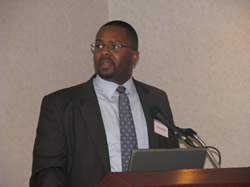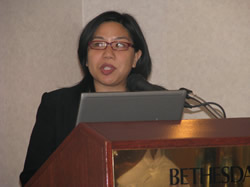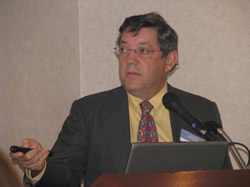| |
NCMHD Advisory Council Meeting Spring 2008
 |
John Ruffin, Ph.D., Director NCMHD
|
At the eighteenth meeting of the National Advisory Council on Minority Health and Health Disparities, John Ruffin, Ph.D., Director, National Center on Minority Health and Health Disparities (NCMHD), unveiled plans for an historic meeting at the NIH. Dr. Ruffin announced that NCMHD would sponsor the NIH’s first Summit on the Science of Eliminating Health Disparities on December 16-18, 2008 at the new Gaylord National Resort and Convention Center, National Harbor, MD.
Dr. Ruffin told the Council, “This will be an opportunity to show the NIH’s collective strength in this research area. The summit will highlight the innovative work of our grantees as well as the advances made at the other Institutes and Centers at the NIH.
The Summit will provide an exciting forum for more than 3000 scientists, health care professionals, educators and community partners to learn and network with health disparities experts from many disciplines. NCMHD is convening the Summit to:
- Highlight the progress of NIH research in minority health and health disparities; activities that are improving prevention, diagnostic, and treatment methods for the medically underserved.
- Increase awareness and understanding of health disparities.
- Showcase best practice models in research capacity building, outreach, and integrated strategies to eliminate health disparities.
As is its practice, the Council heard inspiring presentations from grantees across the wide-spectrum of NCMHD’s research programs. Two Loan Repayment Program recipients told the Council how NCMHD’s support enabled them to move closer to the goal of eliminating health disparities in the populations they study.
Loan Repayment Program
 |
Derek Griffith, Ph.D.
|
Derek Griffith, Ph.D., an Assistant Professor of Health Behavior and Health Education at the University of Michigan, is taking on two important and difficult research areas; men’s health and the role of racism as a determinant of health and health quality.
Dr. Griffith told the council that not worrying about a huge debt allowed him to focus on his research. Dr. Griffith has developed a new program to reduce Cancer risk among men in Detroit, Michigan.
 |
Irene Kuo, Ph.D.
|
Irene Kuo, Ph.D., is an Assistant Research Professor at The George Washington University. Dr. Kuo told the Council that the NCMHD LRP is seen as a prestigious award. She said the process of applying for it gave her confidence in applying for other grants, and that the financial benefits have allowed her to pursue her research in HIV prevention.
Following Dr. Kuo, Dr. Ruffin exclaimed, “I believe we will eliminate health disparities and it will be our LRP people who will lead the effort.”
Centers of Excellence (COE)
 |
Saundra Glover, Ph.D.
|
NCMHD’s Centers of Excellence program has fostered and supported health disparity research agendas in a number of America’s leading academic institutions. The Council heard from two, in South Carolina and Texas.
Saundra Glover, Ph.D., Associate Dean of Health Disparities, Arnold School of Public Health, University of South Carolina, presented a moving video on the work of the Center called the Faces of Health Disparities. Initially funded in 2003, the Center at the University of South Carolina has had a number of successes, including:
- Establishing an endowed lecture series on Health Disparities named after Congressman James Clyburn
- Instituting a new course in Public Health
- Mentoring more than 500 high school and college students and encouraging them to pursue scientific research careers
- Establishing a new virology lab at Claflin University that serves researchers across the state
- Launching new research into the role of acupuncture in relieving stress among people with HIV
 |
"Joseph McCormack, Ph.D.
|
Diabetes management among people of Mexican descent is the research core at the COE overseen by Joseph McCormack, Ph.D., Associate Dean for Health Disparities at the University of Texas, Brownsville Regional Campus. Dr. McCormack showed the council how the research activities at UT Brownsville have grown since it became an NCMHD Center of Excellence. Dr. McCormack said, “Health is about behavior and biology and that the best translational research promotes healthy lifestyles and policy change.”
At this COE, fifty-two percent of the people being studied are obese, a third diabetic, yet only half are under treatment. The research at UT Brownsville has shown a link between diabetes and depression and cognitive decline. A number of interventions are being studied including:
- Forming exercise groups
- Building a walking trail
- Instituting a farmers market
- Using new media to transmit public health messages
Mississippi Institute for Improvement of geographic Minority Health
 |
Warren Jones, M.D.
|
The Council’s outgoing Chair, Dr. Warren Jones described the incredible research innovations occurring in rural Mississippi, breakthroughs made possible by NCMHD grants to the Mississippi Institute for Improvement of Geographic Minority Health. Dr. Jones, who is the Distinguished Professor of Health Policy and Senior Health Policy Advisor at the University of Mississippi and Executive Director of the Institute, says his researchers, “study the interface of rural and minority health through the lens of health disparities.” He says the Institute exists:
- To improve awareness of health care issues among minority individuals with a special emphasis on disadvantaged people living in rural areas;
- To increase access to quality healthcare for rural disadvantaged populations;
- To increase the number of healthcare providers who provide services to traditionally underserved populations,
- To improve health outcomes for minority and rural disadvantaged populations,
- To develop a model for improving minority health and eliminating health disparities that can be replicated across the U.S.
According to Dr. Jones, half of Mississippi’s population lives in rural areas, twenty-five percent have no health insurance and the infant mortality rate is three times the national average. Compared to the rest of America, Mississippi has more diabetes, more obesity, and the highest mortality rate from cardiovascular disease. Nevertheless, the Institute has created model programs that improve awareness of health issues among the poor, access to healthcare, and improved health outcomes.
The institute funded researchers at rural Rust College, who helped create a Doula program to address the problem of low birth weight babies. At Tougaloo College, the Institute helped establish a unique wellness program for seniors. Working with churches across the state, the institute funded research on how to best use faith-based activities to improve health. Dr. Jones said, “We try to get to people where they pray, play and earn their pay.”
In addition, the Institute is investigating possible roles for faith-based organizations to play in addressing the severe mental health issues among minorities in Mississippi.
(back to top)
|
|

